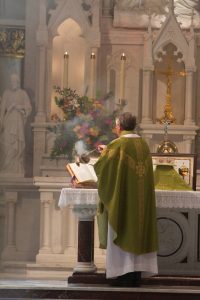 My first thought is that we want to keep the Word of Christ with us in all of our body and soul. You know We make a small Cross on our Four Heads, we are keeping the word on our minds we think about the Word throughout the day, week and as far as you can take it. We make a sign of the Cross on our Lips, you need to speak the Word of the Lord to help keep it alive. We make the sign of the Cross on our hearts, our hearts are to keep the Lords Word in a safe place so you can think and talk about it while giving it away to others who may need to hear it.
My first thought is that we want to keep the Word of Christ with us in all of our body and soul. You know We make a small Cross on our Four Heads, we are keeping the word on our minds we think about the Word throughout the day, week and as far as you can take it. We make a sign of the Cross on our Lips, you need to speak the Word of the Lord to help keep it alive. We make the sign of the Cross on our hearts, our hearts are to keep the Lords Word in a safe place so you can think and talk about it while giving it away to others who may need to hear it.
God “dwells in us.” God’s love is not meant for us alone; we must give it away. Do small things today and for many tomorrows, with a generous heart. Give God Away Today!
Let’s look at what “The General Instruction of the Roman Missal” Has to say about it.
- The gestures and bodily posture of both the Priest, the Deacon, and the ministers, and also of the people, must be conducive to making the entire celebration resplendent with beauty and noble simplicity, to making clear the true and full meaning of its different parts, and to fostering the participation of all. Attention must therefore be paid to what is determined by this General Instruction and by the traditional practice of the Roman Rite and to what serves the common spiritual good of the People of God, rather than private inclination or arbitrary choice.
A common bodily posture, to be observed by all those taking part, is a sign of the unity of the members of the Christian community gathered together for the Sacred Liturgy, for it expresses the intentions and spiritual attitude of the participants and also fosters them.
- The reading of the Gospel constitutes the high point of the Liturgy of the Word. The Liturgy itself teaches the great reverence that is to be shown to this reading by setting it off from the other readings with special marks of honor, by the fact of which minister is appointed to proclaim it and by the blessing or prayer with which he prepares himself; and also by the fact that through their acclamations the faithful acknowledge and confess that Christ is present and is speaking to them and stand as they listen to the reading; and by the mere fact of the marks of reverence that are given to the Book of the Gospels.
- A t the ambo, the Priest opens the book and, with hands joined, says, The Lord be with you, to which the people reply, And with your spirit. Then he says, A reading from the holy Gospel, making the Sign of the Cross with his thumb on the book and on his forehead, mouth, and breast, which everyone else does as well. The people acclaim, Glory to you, O Lord. The Priest incenses the book, if incense is being used (cf. nos. 276-277). Then he proclaims the Gospel and at the end pronounces the acclamation The Gospel of the Lord, to which all reply, Praise to you, Lord Jesus Christ. The Priest kisses the book, saying quietly the formula Per evangelica dicta (Through the words of the Gospel).
The next time you sign your Mind, Lips, and Heart or Soul with the Cross before the Gospel make sure that it means more than just an external gesture, make sure it is also a prayer and an invitation to give Christ away, to Keep Christ Alive.
